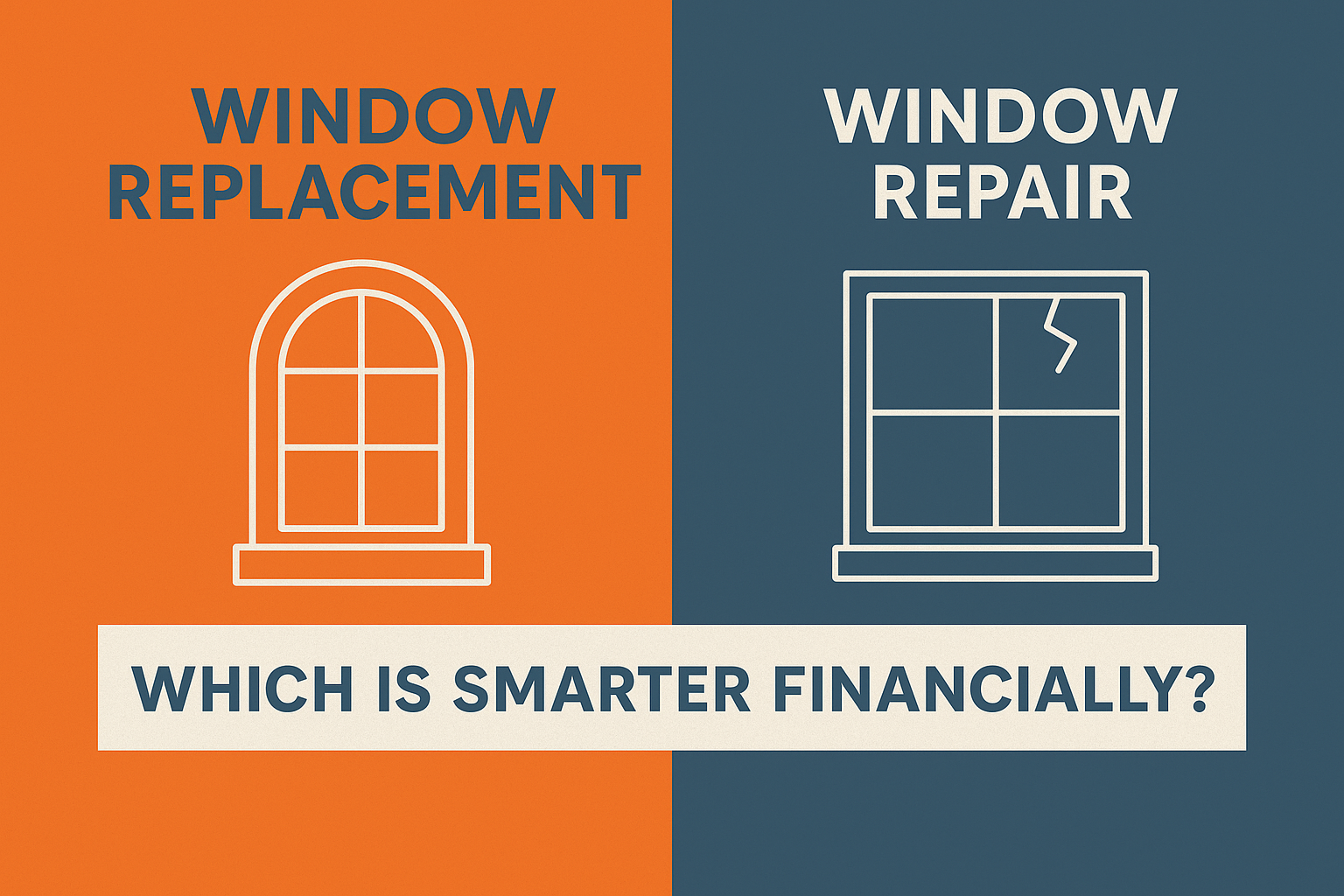Introduction
Windows are more than just glass openings that let light into your home. They influence your comfort, your energy bills, your home’s value, and even its overall safety. But as they age, you’ll eventually face the question: Is it better to repair or replace my windows?
The answer isn’t always black and white. While repairs can extend the life of your windows, replacement can deliver long-term savings and benefits that repairs simply can’t match. This blog will dive deep into the financial considerations, hidden costs, and real-world scenarios so you can make the best decision for your home and budget.
The Financial Case for Window Repair
1. Lower Upfront Cost
The most obvious benefit of repair is cost. Depending on the issue, repairs typically cost between $100 and $400 per window, far less than replacement. For homeowners with newer windows or isolated issues, this can be the smart financial decision in the short term.
2. Common Repairs That Make Sense
Repairs are a good option if:
- Locks, handles, or hinges are broken – Hardware is relatively inexpensive and easy to replace.
- Weatherstripping is worn out – Seals can be replaced to stop drafts.
- Glass is cracked but the frame is intact – Replacing only the pane is far cheaper than a full unit.
- Windows stick or won’t stay open – Replacing sash balances may solve the problem.
In these cases, spending a few hundred dollars can restore function without the heavy investment of full replacement.
3. When Repairs Become a Money Pit
However, repairs stop making financial sense when:
- The same issues keep recurring.
- The window is already 15–20 years old.
- Frames are showing signs of rot, warping, or moisture damage.
- Repairs cost more than 15–20% of a new window.
At this point, you’re throwing money at a temporary fix instead of investing in a long-term solution.
The Financial Case for Window Replacement
1. Energy Efficiency and Lower Utility Bills
Old or poorly insulated windows are among the biggest culprits of energy loss in a home. According to the U.S. Department of Energy, heat gain and loss through windows account for 25–30% of residential heating and cooling energy use.
Replacing old single-pane or inefficient double-pane windows with ENERGY STAR® certified models can:
- Save homeowners $125–$465 per year on energy costs (depending on climate).
- Make rooms more comfortable year-round by reducing drafts and hot spots.
Over 10–15 years, those savings can add up to thousands of dollars—easily offsetting the upfront cost.
2. Increased Home Value
New windows are one of the few home improvements that deliver a strong return. Remodeling Magazine’s Cost vs. Value Report shows that homeowners recoup about 70–75% of their investment when selling.
For example:
- A $12,000 window replacement may add $8,400–$9,000 to resale value.
- Homes with new, energy-efficient windows tend to sell faster because buyers see them as a “big ticket” improvement already handled.
3. Reduced Maintenance Costs
Newer windows often come with features like:
- Tilt-in sashes for easy cleaning.
- Vinyl or composite frames that don’t need painting.
- Double or triple-pane glass with low-E coatings that resist condensation.
This means fewer repair costs and less maintenance—another financial advantage over time.
4. Safety & Insurance Benefits
Modern windows offer:
- Stronger locks and shatter-resistant glass for improved security.
- Impact-resistant options in storm-prone areas, which may reduce insurance premiums.
While harder to measure, these benefits add financial and peace-of-mind value.
Comparing Costs: Repair vs. Replacement
Here’s a side-by-side breakdown:
| Factor | Repair | Replacement |
|---|---|---|
| Upfront Cost | $100–$400 per window | $1200–$2,200 per window (standard vinyl) |
| Energy Savings | Minimal | $125–$465 annually per home |
| Maintenance | Issues may return | Low maintenance with modern materials |
| Lifespan Extension | Adds 3–5 years | Adds 20–30 years |
| Resale Value | Little to none | 70–75% ROI |
Repairs win on short-term cost, but replacements nearly always win in long-term financial value.
Long-Term vs. Short-Term Thinking
One of the most important questions to ask yourself is: How long do I plan to stay in this home?
- If you’re selling within 1–2 years: Strategic repairs may be enough to keep the home marketable, unless your windows are clearly outdated or damaged. In that case, replacement can boost curb appeal and resale value.
- If you’re staying 5+ years: Replacement is usually the smarter financial move. The energy savings and comfort improvements will pay back your investment over time.
Hidden Costs to Consider
Many homeowners overlook hidden costs that tilt the scale toward replacement:
- Higher Utility Bills from Old Windows
Drafty windows can quietly drain your budget. Even an extra $50 per month in heating/cooling adds up to $600 annually. - Repeated Repairs
Spending $300 every year on repairs quickly adds up to the cost of a new window. - Home Value Loss
Buyers often negotiate down home prices if they see windows need replacement, costing sellers thousands more than if they had invested upfront. - Insurance Risks
Outdated or unsafe windows may lead to higher premiums or denied claims in some situations.
Real-Life Scenarios
- Scenario 1: Minor Issues
A 7-year-old vinyl window with a broken lock. Repair costs $150. Replacement would cost $800. Financially, repair is the smart move here. - Scenario 2: Drafty, Old Windows
A 20-year-old single-pane window with drafts and condensation. Repair costs $350, but energy loss costs the homeowner $400+ annually. Replacement at $900 per window is smarter long-term. - Scenario 3: Selling a Home
A homeowner plans to sell in 12 months. The windows are outdated, but not damaged. Replacing them may cost $10,000, but add $7,500+ in resale value while helping the home sell faster—making it a worthwhile investment.
FAQs
Q: How long do replacement windows last?
Most modern vinyl or fiberglass windows last 20–30 years, while wood windows can last even longer with maintenance.
Q: Are there financing options for replacement windows?
Yes, many window companies offer financing plans to make replacement more affordable, often with low monthly payments.
Q: Can I replace just one or two windows at a time?
Yes, though for energy efficiency and appearance, many homeowners replace all visible windows at once.
Q: Do new windows really make a big difference in comfort?
Absolutely. Beyond energy savings, homeowners often notice fewer drafts, less outside noise, and more consistent room temperatures.
Final Thoughts
When deciding between window repair and replacement, the key is balancing short-term costs with long-term financial benefits.
- Repair is smarter if your windows are newer, the issue is minor, and you need a budget-friendly fix.
- Replacement is smarter if your windows are old, inefficient, or damaged—or if you plan to stay in your home long-term and want to maximize comfort, energy savings, and resale value.
👉 Ready to find out what’s right for your home? Schedule a free consultation today, and let our experts give you an honest assessment so you can make the smartest financial decision.

